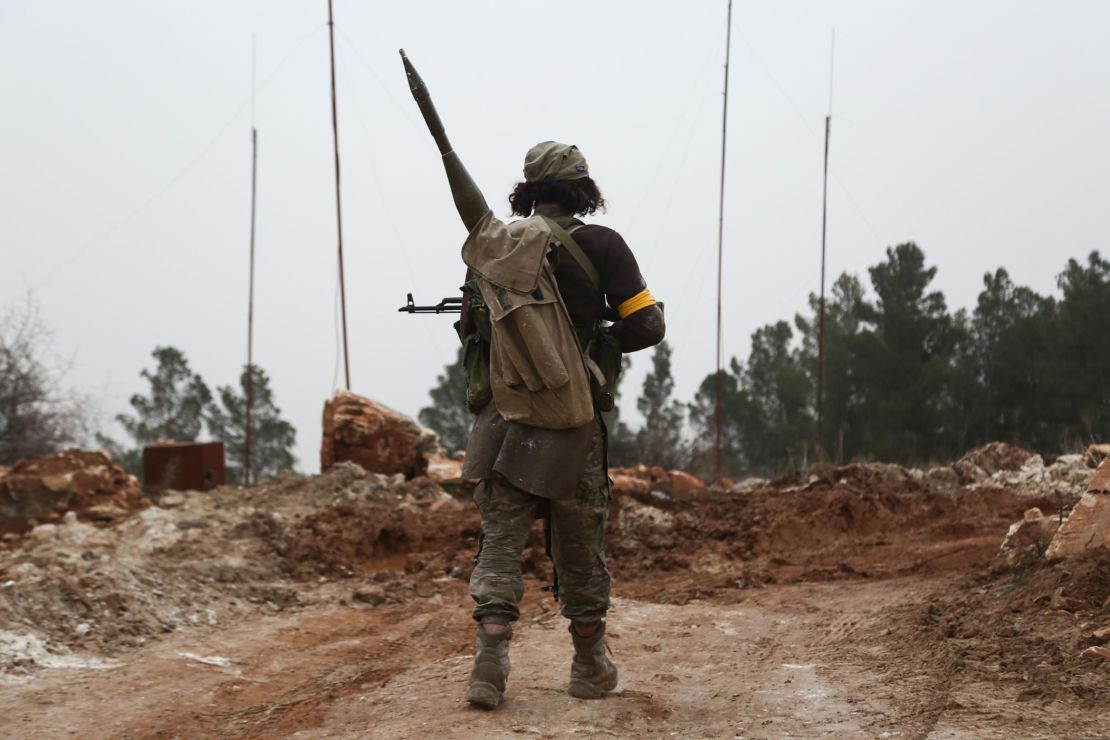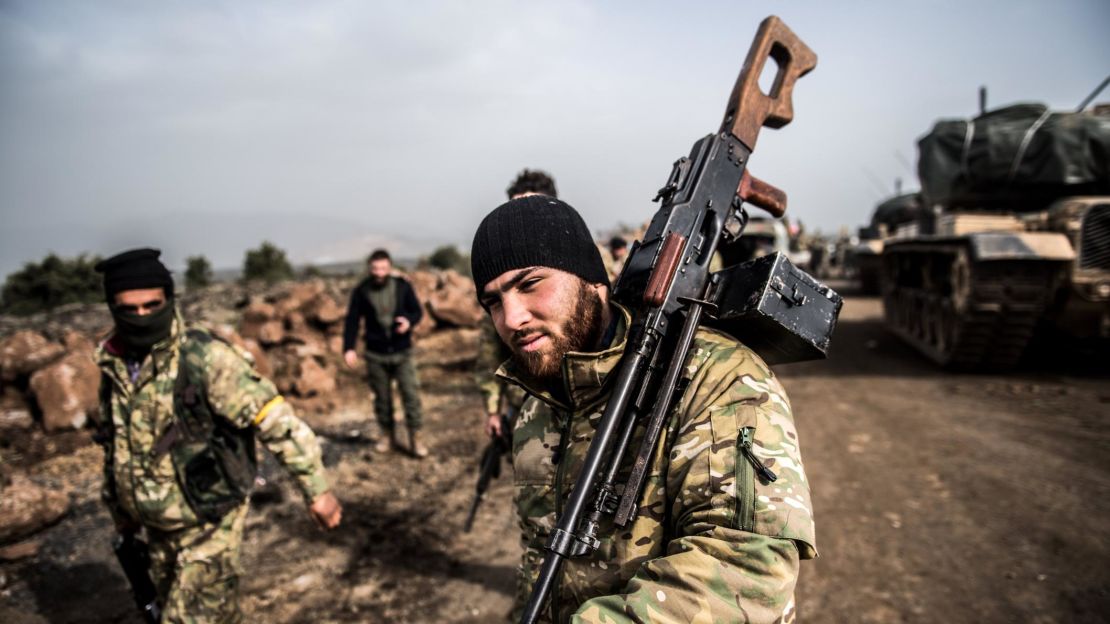Story highlights
Among the disagreements: Whether the fight against ISIS is over or not
Turkey wants the US to reclaim weapons it gave a Kurdish fighting group
Turkey’s attacks on Kurdish-controlled areas of Syria are stripping bare deep tensions with the United States and are sure to be a topic of discussion in a call between President Donald Trump and President Recep Tayyip Erdogan that’s set for Wednesday.
The Turkish assault on Afrin, controlled by a US-allied group of Syrian Kurds called the YPG, is just the latest source of friction between the two NATO allies. The two countries have sparred over a slew of issues in recent years, including the fate of a US-based cleric Turkey accuses of a coup attempt, visas to each other’s countries, Turkey’s entanglements with Iran and its detention of an American pastor.
The disconnect is such that the two countries don’t agree on whether the YPG is a terrorist group or whether ISIS has been defeated.
One thread underlying many of the disagreements, analysts say, has been Turkey’s domestic politics and Erdogan’s steady dismantling of the democratic norms that once made his country a strong contender to join the European Union.
‘Lots of uncertainties’
At the same time, Erdogan has nestled ever closer to Russia, raising questions about his commitment to NATO and to the future of US-Turkey relations.
“There are lots of uncertainties,” said Marc Pierini, a former European Union ambassador to Turkey. “Nobody is very sure where we are going.”
Another former ambassador to Turkey, Eric Edelman of the US, said the currents running through Turkish domestic politics are tightly intertwined with perceptions of the US.
“The relationship between the US and Turkey has been very tense for a very long time,” Edelman told CNN. “Those tensions in some way are rooted in the nature of the regime that Erdogan is attempting to impose on Turkey, which to some degree is fueled by anti-Americanism.”
White House press secretary Sarah Sanders said Tuesday that Trump and Erdogan will speak by phone Wednesday: “We want them to de-escalate. I think you can expect that to be part of the conversation, but I don’t want to get head of their call.”
Turkey’s relations with Europe have soured as well, to the point that four countries have now formally declared themselves against Ankara’s accession to the EU. In the past few years, Turkey has “so dismantled the rule of law in the country you don’t have anymore an independent judiciary or freedom of the press, and civil society has been suppressed. Essentially, Turkey has abandoned all the political criteria of membership in the EU,” Pierini said.
Turkey’s place in NATO is less easy to navigate. “There’s no mechanism for expelling a NATO ally, but if there were one, this would be an active debate inside the alliance,” Edelman said.
He notes that Turkey is “coordinating with the Russians. They’re buying equipment from Russia that’s not compatible with NATO equipment. They’re holding Americans hostage,” he said, referring to Andrew Brunson, a pastor from North Carolina arrested and charged by the Turks with membership in a terrorist organization.
Erdogan has proposed swapping Brunson for the Pennsylvania-based cleric Fethullah Gulen, who he accuses of plotting a 2016 coup against him. The US has declined to extradite Gulen because of a lack of evidence.
‘Not behaving like a NATO ally’
“The Turks are not behaving like a NATO ally,” Edelman said.
The thorniest issue between the US and Turkey – the YPG question – has played out against the backdrop of the increasingly complex Syrian conflict. Turkey and the US have circled each other over the group of Syrian Kurds, which has helped battle ISIS using US-provided weapons and now controls a wide swath of northern Syria.
Turkey sees the quest by the Kurds – who are spread out in Turkey, Syria and Iraq – to establish an independent homeland as an existential threat to its territorial integrity.
While the YPG has been the most effective fighting force on the ground against ISIS and a huge help to the US-led campaign, Turkey sees them as indistinguishable from Kurdish groups within its borders that it’s been battling for years.
On Monday, Erdogan blasted the US for supporting what he called a “terrorist organization,” and he has said he will push the YPG back from the Turkish border.

“Erdogan has promised he will finish off the YPG in Afrin and anywhere else all the way up to the Iraqi border,” Pierini said. “It’s also the same thing as saying, ‘We’re going to push back the US.’ ”
Although Pierini and other analysts say Erdogan is known for bluster, the former EU diplomat adds that “if his words translate into military action, you have a real potential for clashes between the Turkish army and US forces.”
The differences of opinion extend to the two countries’ views of the ongoing fight against ISIS.
US officials say they are telling their Turkish counterparts publicly and privately that they’re aware of Ankara’s security concerns about the Syrian Kurds, but they are strongly emphasizing that the battle against ISIS isn’t finished and that they need the focus to remain on defeating the terrorist group.
“ISIS is far from defeated,” said an administration official. “This is far from over, and this is not the time to try to divert attention.” South of Raqaa, ISIS still controls enclaves and is using the area to try to regroup, the official said.
Sanders made the same plea Monday, saying White House officials “hear and take seriously Turkey’s legitimate security concerns” but that “increased violence … distracts from international efforts to ensure the lasting defeat of ISIS.”
Turkish officials, however, insist that the terror group has been defeated. A top Erdogan adviser told CNN’s Christiane Amanpour on Tuesday that Washington had assured Turkey it would support Kurdish militias only until ISIS was defeated.
“They told us many times that once [the] Daesh threat is eliminated, there won’t be any more support – military support – to PYD, YPG,” said Ibrahim Kalın, a senior adviser and spokesperson for Erdogan, naming Kurdish groups.
“Now ISIS is eliminated, but unfortunately support or military aid – equipment, ammunition, weaponry, etc. – continues to go to this PYD, YPG groups there,” said Kalın. “So the question is, ‘Why are you still supporting them?’ “
Turkish Deputy Prime Minister Bekir Bozdag demanded Monday that the US end its support for the YPG. The “road to our cooperation is clear: Stop giving weapons and collect the weapons given before,” Bozdag said during a news conference in Ankara.
‘Operation Olive Branch’
Discussing the offensive in Afrin, which the Turks have called Operation Olive Branch, Bozdag said the operation wasn’t a “choice” but an “obligation” for Turkey. “It has been going successfully according to plan and it would continue with the same success,” he said.
Turkey essentially had to ask Russia for permission for the operation, since Moscow controls the airspace over Afrin.
Kremlin spokesman Dmitry Peskov said Monday during a regular conference call with reporters, “We very closely watch the course of the operation. Russian representatives are in contact with both Syrian leadership and Turkish leadership, including on this matter.”
US officials are telling the Turks they will help them figure out a negotiated solution that will address their concerns about the Kurds. But they say privately that they aren’t clear how the Turks intend the Afrin operation to play out longer term.

To that end, US defense officials now in Turkey are trying to understand what the longer game plan is and are pressing Turkish officials to clarify just what it is they plan to do by going into Kurdish areas.
“Are they planning on being an occupier of these areas the Kurds now control? We want to understand what they’re thinking,” the administration official said.
Pentagon spokesman Marine Maj. Adrian Rankine-Galloway confirmed that senior defense officials are in Ankara as part of a US government delegation to discuss security concerns, including the situation in Afrin.
These leaders “are fully engaged in working with their Turkish counterparts to de-escalate tensions along the Turkish-Syrian border and to ensure that operations to defeat ISIS continue without interruption,” Rankine-Galloway said.
“We take seriously Turkey’s legitimate security concerns and are committed to working with Turkey as a NATO Ally and a partner to defeat ISIS and other terrorist groups,” Rankine-Galloway added.
CNN’s Ryan Browne in Washington, CNN’s Hande Atay Alam in Atlanta and Emma Burrows in Moscow contributed to this report





